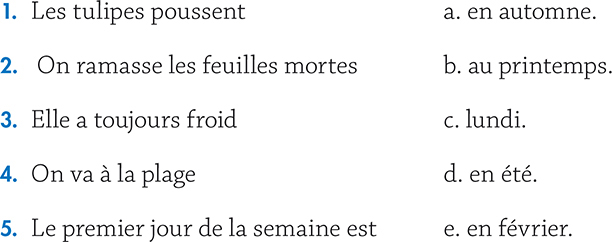3 The Verb Aller and Speaking About Time
Pick up your calendar because this chapter is all about making plans. To make plans, you’ll need to know the days of the weeks and the months of the year. You’ll also need to learn how to tell time using the 24-hour clock; otherwise, you might miss your flight!
Aller
The verb aller is one of the most frequently used verbs in French. While its literal translation is to go, aller is used in many idiomatic expressions.


With the verb aller, inverting in the first-person singular je requires a bit more attention than the other subject pronouns do. Doing this is considered formal, so it largely depends on the context.

Notice that in the first example, we are using vais-je in a professional context, perhaps with an employer or an administrator. And in the second example, it is used with dramatic effect in Phèdre, a classic seventeenth-century play by Jean Racine.
Idiomatic Expressions with Aller
You cannot truly speak French without employing at least a few idiomatic expressions with the verb aller.

The Immediate Future
Aller is often paired with the infinitive of another verb to indicate that one is going to do something. With the immediate future, it is expected that the action be realized in the very near future; otherwise, you would use the futur simple. We’ll see that in Chapter 10.
To form the immediate future tense, combine the present form of aller with the infinitive of the main verb, its unconjugated form. It should look something like this:
Here is an example with the verb partir:

Time Words and Expressions
Whether you want to see a movie, sign up for a course, invite someone to dinner, or all of the these things, memorizing these key time words will make your life much easier.
Basic Time Words
You cannot make plans without knowing when to meet. For this, time words are key.
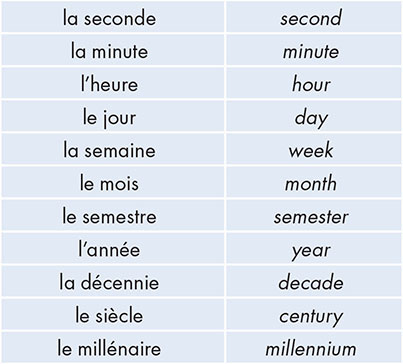
Days of the Week
Notice how the week in French starts on Monday and how the words are not capitalized.



Another case where le is used with days is when referring to a specific date. It follows the format le + nombre + mois. That’s why the famous French holiday Bastille Day is referred to as le 14 juillet!

Months
En is the preposition that is used in front of the months. And like the days, the months of the year are not capitalized.


Seasons
Note that while we say en été, en automne, and en hiver, we say au printemps.

There are three cases used with seasons: en, le, and au.

Time Adverbs
Now that we’ve seen the days, months, and seasons, let’s take a look at some useful adverbial expressions of time. The following adverbial expressions are used when speaking directly to people in what is known as direct speech.


When narrating a past or future event, something known as indirect speech is used. It is “indirect” in the sense that one is describing the event as an outsider. Familiarize yourself with the following adverbial expressions.


Here are some additional adverbs or expressions of time:
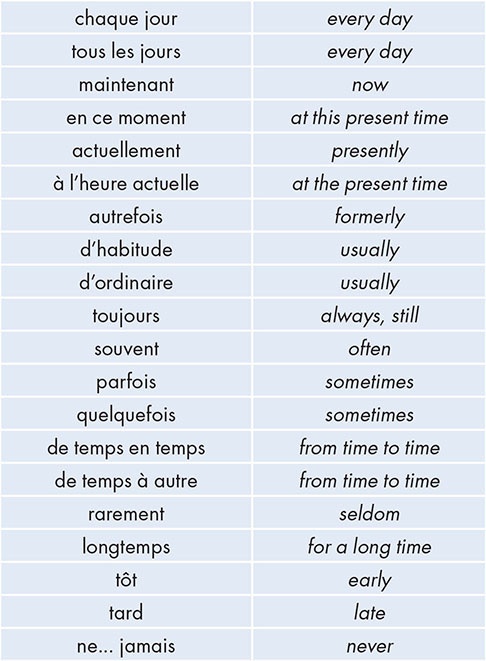

Telling Time
This is how you casually ask about and tell time in French.
Quelle heure est-il? What time is it?
■ On the hour:

■ On the half or quarter hour:

Note that midi and minuit are masculine, so demi does not take the final e. But since heure is feminine, demie agrees.

Now let’s go all the way around the clock!
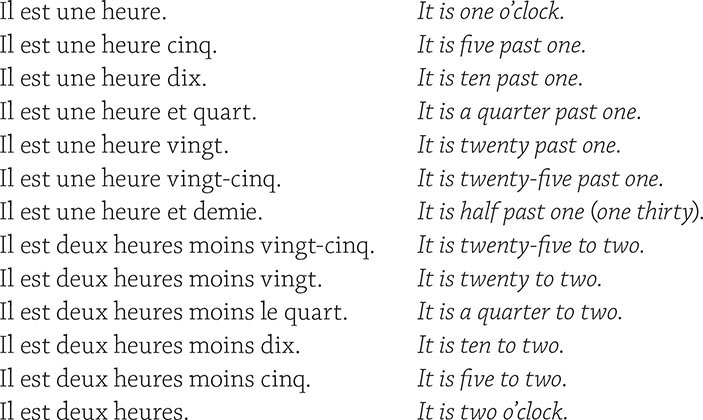
To make explicit whether am or pm is being referred to, add either du matin (in the morning), de l’après-midi (in the afternoon), or du soir (in the evening):

Time with the 24-Hour Clock
In formal settings like at train stations and business offices, time is referred to as a 24-hour block (rather than merely going up to 12). To switch from the 12-hour clock to the 24-hour clock, add twelve hours to every hour past noon.
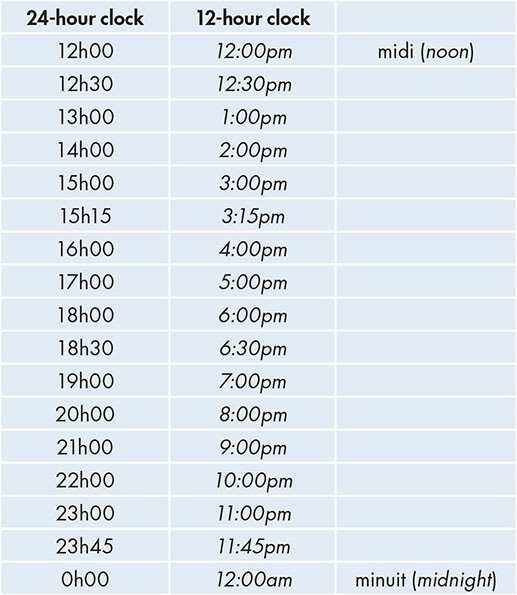

Introducing -re Verbs
As you continue your French studies, you will inevitably come across -re verbs. And like all grammar concepts, there are regular -re verbs and irregular -re verbs. But don’t worry, vous allez très vite comprendre!
—you will understand very quickly!
Regular -re Verbs in the Present Tense
To conjugate regular -re verbs, remove the infinitive ending -re and add the following endings:
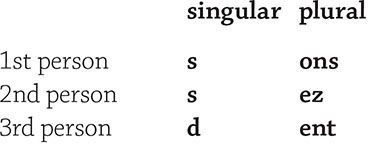
Here is how we conjugate the verb attendre (to wait/to expect):


Below are some more regular -re verbs that are conjugated in the same way.



Some Irregular -re Verbs
French has many irregular -re verbs, so let’s get acquainted with a few essential ones.


Here are some derivatives of the verb prendre:


 DIALOGUE Vive les vacances! Long live vacations!
DIALOGUE Vive les vacances! Long live vacations!
Émilie meets Julien, a neighbor in the hallway of their building, and talks about vacation destinations.


EXERCISES
EXERCISE 3.1
Conjugate the verb aller in the present tense.
1. Je _______________ chez le dentiste mardi.
2. Est-ce qu’elle _______________ au cinéma ce soir?
3. Nous _______________ chez Auchan une fois par mois.
4. Je ne _______________ pas à la piscine sans toi!
5. Est-ce qu’il _______________ chez le coiffeur aujourd’hui?
6. Nous _______________ en Australie en avril.
7. —Comment _______________ la mère de Céleste? —Elle _______________ très bien.
8. Est-ce que tu _______________ à l’école à bicyclette?
9. _______________-vous à Angoulême en voiture ou en train?
10. Est-ce que vous _______________ au Portugal cet été?
EXERCISE 3.2
Rewrite the following sentences as questions using inversion. Watch out for spelling changes.
1. Vous allez à Monoprix cet après-midi.
2. Tu vas au pique-nique d’Alice sur l’Île aux Cygnes.
3. Il va au Théâtre du Rond-Point.
4. Elles vont à l’Institut de Touraine pour apprendre le français.
5. Il va chez sa grand-mère samedi.
6. Nous allons faire une promenade sur un bateau-mouche.
7. Elle va au conservatoire de musique de Marseille.
8. Vous allez en Louisiane cet été.
9. Tu vas à Milan en avion.
10. Vous allez au bureau ce matin.
EXERCISE 3.3
Rewrite the following sentences in the immediate future tense.
1. J’invite mes voisins à prendre un verre.
2. Il téléphone à son coiffeur dans le Marais.
3. Elles étudient la musique baroque au conservatoire.
4. Elle travaille en Asie.
5. Vous jouez au tennis avec Maude.
6. Tu prends des photos pendant les vacances.
7. Guillaume déjeune avec sa patronne.
8. Je reste chez moi ce week-end.
9. Frédéric et Line préparent leurs valises.
10. Nous chantons une chanson pour son anniversaire.
EXERCISE 3.4
Put the following sentences in the negative form.
1. Nous allons visiter le château de Chambord aujourd’hui.
2. Je vais étudier le français dans une école à Perpignan.
3. Il va prendre une semaine de vacances en avril.
4. Elle va avoir le temps d’aller au supermarché ce soir.
5. Vous allez être en retard pour votre rendez-vous.
6. Ils vont être à l’aise en classe économique.
7. Elles vont parler anglais avec Justin.
8. Tu vas apporter le livre d’économie en classe.
9. Je vais mélanger le citron et le miel dans la tasse.
10. Ils vont financer l’organisation.
EXERCISE 3.5
Translate the following sentences using the immediate future tense. When asking questions, use the est-ce que form.
1. I am going to buy a Navigo Pass for the subway.
2. They are going to play in André Citroën Park.
3. Julien is going to be hungry after tennis.
4. We are going to start a new lesson today. (nous)
5. I am not going to work this weekend.
6. We are going to have lunch at noon. (on)
7. They are going to organize the reception for sixty people.
8. Are you going to ask difficult questions? (vous)
9. Pauline is going to be fifteen tomorrow.
10. Florent is going to call his mother after dinner.
EXERCISE 3.6
Match the items in the two columns. Choose the most logical answers.
EXERCISE 3.7
Translate the following sentences using the tu form when necessary. When asking questions, use the est-ce que form.
1. Marion is going to buy a Navigo Pass on Monday.
2. In March, Alexis is going to study French at Rennes University.
3. In the fall, Noémie’s parents are going to the Canary Islands.
4. Is your birthday in September?
5. I play tennis with Matthias on Wednesday afternoons.
6. Thomas and Léa are going to meet Justin on Tuesday.
7. Is the reception on Saturday or Sunday?
8. We are going to the Fête de la Musique in June.
9. Winter is very long in Siberia.
10. I am going to travel to Louisiana in the spring.
EXERCISE 3.8
Translate the words in parentheses.
1. —Émilie passe un examen (today) _______________? —Non, elle passe un examen (tomorrow) _______________.
2. —Jean-Luc rentre (this afternoon) _______________? —Non, il rentre (tomorrow afternoon) _______________.
3. —Lucie travaille (tomorrow) _______________? —Non, elle travaille (the day after tomorrow) _______________.
4. —Tu es disponible (this week) _______________? —Non, je suis disponible (next week) _______________.
5. —Vous dînez (often) _______________ avec Jean? —Non, je dîne avec Jean (from time to time) _______________.
6. —Muriel part (in a week) _______________? —Non, elle part (in a month) _______________.
7. —Il arrive (sometimes) _______________ en avance? —Non, il arrive (always) _______________ en retard.
8. —Tu manges des légumes (every day) _______________? —Oui, je mange des légumes (every day) _______________.
9. Vous allez (often) _______________ à Trouville? —Non, nous n’allons (never) _______________ à Trouville.
10. —Elle va (sometimes) _______________ au jardin du Luxembourg? —Non, elle va (rarely) _______________ au jardin du Luxembourg.
EXERCISE 3.9
Translate the following sentences using vous when necessary. When asking a question, use inversion.
1. We are going to France next week.
2. Gérard is going to Australia in a month.
3. Today is Muriel’s birthday.
4. We are going to meet François for the first time in Paris next week.
5. —Are you going to call Alice’s friends tomorrow? —No, in two or three days.
6. She is taking her exam next week. The following week she is going to travel to India.
7. Tomorrow I am going to wear my blue suit.
8. The day before Daniel’s birthday, it was my birthday.
9. Are you going to leave tomorrow? – No, I am leaving the day after tomorrow.
10. He is arriving in Strasbourg on Thursday, and he is going to Prague the following day.
EXERCISE 3.10
Write out the times in expanded form. Use the 24-hour clock.
1. 4:30pm
2. 5:45pm
3. 8:10pm
4. 9:40pm
5. 11:50pm
EXERCISE 3.11
Conjugate the following verbs in the present tense.
1. Je (entendre) _______________ une chanson de Mika.
2. La skieuse (descendre) _______________ la piste très rapidement.
3. Je (rendre) _______________ un livre de science-fiction à la bibliothèque.
4. André (vendre) _______________ sa moto.
5. Vous (attendre) _______________ Zoé?
6. Il (prétendre) _______________ en savoir plus que moi.
7. La presse à sensation (répandre) _______________ des rumeurs sur la famille royale.
8. Nous (perdre) _______________ trop de temps à vous attendre.
9. Le professeur me (tendre) _______________ la main pour me dire bonjour.
10. Nous (répondre) _______________ au questionnaire.
EXERCISE 3.12
Match the items in the two colums. Choose the most logical answers.
EXERCISE 3.13
Conjugate the following verbs in the present tense.
1. Nous (comprendre) _______________ votre dilemme.
2. Ils (entreprendre) _______________ un grand voyage.
3. Vous (apprendre) _______________ à jouer de la flûte.
4. Est-ce que tu (prendre) _______________ l’autobus ou le métro?
5. Joël (surprendre) _______________ souvent ses collègues.
6. Ils (comprendre) _______________ l’importance de ce sommet international.
7. Les rumeurs sur la famille royale ne me (surprendre) _______________ jamais.
8. Boris ne (comprendre) _______________ rien au manuel d’utilisation pour cet appareil.
9. Je (apprendre) _______________ les paroles d’une chanson de Yannick Noah.
10. La France (entreprendre) _______________ des réformes économiques essentielles.
EXERCISE 3.14
Translate the following sentences in the present tense. When asking questions, use the est-ce que form.
1. We are waiting for Janine’s visit. (on)
2. Do you sell French magazines? (vous)
3. Why are you learning Japanese? (tu)
4. They rarely take the subway to go downtown.
5. I’ll return the book to the library tomorrow morning! I promise!
6. We answer the teacher in French. (nous)
7. I don’t understand why they are always late.
8. Pierre never loses anything on the train.
9. She claims to be my friend.
10. We are going down the Champs-Élysées. (nous)

LE COIN DES CRÉATEURS
L’ACROSTICHE
An acrostic is a series of lines in which the first letter in each line forms a name or a message when read in sequence.

Take a friend’s name and find a series of adjectives or nouns that best describe him or her—with the help of another friend, your dictionary—to make a flattering portrait. Pay attention to the masculine or feminine form of the adjective according to the person you choose.
NOTE CULTURELLE
ARCACHON AND THE DUNE OF PILAT
Spend some time in France and you will most certainly hear reference made to l’Hexagone, “the hexagon,” and you may wonder what it is. It is actually the nickname the French have for their country, which, when you look carefully at a map of France, does seem to be six-sided. Four of those six sides face the sea and, with 2,130 miles of coastline, there are many beautiful beaches and coastal areas to be visited and enjoyed. One such area, in southwest France, is the seaside resort town of Arcachon and the nearby Dune of Pilat, a 1.6-mile natural sand dune that is the tallest in Europe. At first glance, its very size makes it appear like a desert right off the coast of France, but it really is one of the most beautiful sandboxes in the world! With more than one million visitors per year, the Dune of Pilat and the nearby town of Arcachon are famous tourist destinations, beautiful in summer and winter alike. What makes them special?
Arcachon’s history dates back to Louis XVI, who wanted to turn its bay into a military port. To do so, it was necessary to stop the sand in the dunes from moving. Civil engineers worked to resolve this problem and came up with the idea of planting trees and other vegetation as a way of creating a natural barrier. It was successful, but the military port was never built. However, in the early nineteenth century, the location was already known for the quality of its climate. With the building of the Bordeaux–La Teste railroad line, which brought in people from all over the region, it began to grow, and in 1823, the first bathing establishment, designed to serve a wealthy clientele, was opened.
In 1857, Arcachon, formerly a district of La Teste-de-Buch, was created as a separate community by imperial decree of Napoléon III. The Pereire brothers, bankers and railroad owners, decided to extend the railroad line as far as Arcachon, hoping to increase its importance as a commercial location and port. While they achieved only minimal success, they also worked to develop summer and winter tourism. Arcachon became known not just for the beauty of its beaches but also as destination for those seeking to improve their health. Its climate and natural springs were also a draw for those suffering from chronic diseases such as rheumatoid arthritis and tuberculosis. Some of the more wealthy decided to settle there permanently, building large villas and mansions in a variety of architectural styles.
Today Arcachon has four districts, named for the four seasons. The Ville d’Été, the summer district, is home to shopping streets, the town’s sandy main beach, and a casino located in the nineteenth-century Château Deganne. The Ville d’Hiver, the winter district, is famous for its extravagant nineteenth-century villas. South of the town is the Dune de Pilat. Visitors come for the beach, for the dunes, and for the unique, picturesque architecture. Since 1985, the entire Ville d’Hiver district has been classified as a historic monument.
 KNOW
KNOW To ask how someone is doing, use the verb aller.
To ask how someone is doing, use the verb aller.

